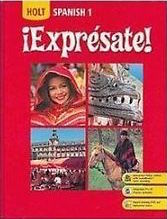
Expresate!: Spanish 1
1st Edition
ISBN: 9780030452048
Textbook solutions
All Solutions
Page 99: 27
Exercise 1
Step 1
1 of 4
In this section, you are asked to write a sentence describing what each subject does on the weekends, based on the given subject and picture.
The example shows a woman listening to music while lounging on the couch. The given subject is *”yo”*, and the written sentence is “I listen to music and rest”.
The first exercise shows two kids playing soccer, and the given subject is “*nosotros*”.
The example shows a woman listening to music while lounging on the couch. The given subject is *”yo”*, and the written sentence is “I listen to music and rest”.
The first exercise shows two kids playing soccer, and the given subject is “*nosotros*”.
Step 2
2 of 4
First, let’s figure out what verb we will be using for our sentence. The given picture clearly shows two kids playing soccer, and back on page 83 we learned that the verb for playing a sport is “*jugar*”. Following this verb with *”…al fútbol”* and you’ve created the phrase “to play soccer”.
Step 3
3 of 4
Finally, we need to conjugate the verb “*jugar*” in order to fit the given subject. Back on page 98, you learned how to conjugate regular (as opposed to irregular) verbs. The ending “-amos” is indicative of the *nosotros* form, so this is the ending we will tack onto the root “jug-” to create our conjugated verb.
Result
4 of 4
Jugamos al fútbol.
Exercise 2
Step 1
1 of 4
In this section, you are asked to write a sentence describing what each subject does on the weekends, based on the given subject and picture.
The example shows a woman listening to music while lounging on the couch. The given subject is *”yo”*, and the written sentence is “I listen to music and rest”.
The second exercise shows a guy walking in the park, and the given subject is “Juan”.
The example shows a woman listening to music while lounging on the couch. The given subject is *”yo”*, and the written sentence is “I listen to music and rest”.
The second exercise shows a guy walking in the park, and the given subject is “Juan”.
Step 2
2 of 4
What verb will you be using for your sentence? Well, at the very beginning of this chapter, you learned that *”pasear*” is the infinitive form of the verb “to walk”. Now you simply need to conjugate it for our given subject, Juan.
Step 3
3 of 4
On page 98, you learned that the ending “-a” is indicative of the third-person, singular form of an “-ar” verb. Since our subject is Juan (“*él”*), this is the ending we will use. In following the precedent set by the example, we will not include a pronoun, or Juan’s name, in the answer. Simply the conjugated verb.
Result
4 of 4
Pasea.
Exercise 3
Step 1
1 of 4
In this section, you are asked to write a sentence describing what each subject does on the weekends, based on the given subject and picture.
The example shows a woman listening to music while lounging on the couch. The given subject is *”yo”*, and the written sentence is “I listen to music and rest”.
The third exercise shows two girls swimming, and the given subject is, *”ellas”*.
The example shows a woman listening to music while lounging on the couch. The given subject is *”yo”*, and the written sentence is “I listen to music and rest”.
The third exercise shows two girls swimming, and the given subject is, *”ellas”*.
Step 2
2 of 4
You learned way back at the beginning of this chapter that the verb for “to swim” is “*nadar*”. This will be the only verb you will use, since it is the only activity that is glaringly apparent from the picture.
Step 3
3 of 4
Finally, you simply need to conjugate the verb from step 2 in order to fit the given subject. On page 98, you learned how to conjugate regular, “-ar” verbs in the present tense. The ending “-an” is indicative of the *”ellos, ellas, ustedes*” form of an “-ar” verb. Since our subject is *”ellas”*, this is the form we will use for our verb, “*nadar”*.
Result
4 of 4
Nadan
Exercise 4
Step 1
1 of 4
In this section, you are asked to write a sentence describing what each subject does on the weekends, based on the given subject and picture.
The example shows a woman listening to music while lounging on the couch. The given subject is *”yo”*, and the written sentence is “I listen to music and rest”.
The fourth exercise shows a girl doing something on a computer, and the given subject is “*mi mejor amiga*”.
The example shows a woman listening to music while lounging on the couch. The given subject is *”yo”*, and the written sentence is “I listen to music and rest”.
The fourth exercise shows a girl doing something on a computer, and the given subject is “*mi mejor amiga*”.
Step 2
2 of 4
While it isn’t entirely obvious what the subject is doing on the computer in the picture, we have learned one phrase that is computer-specific that would probably be our best option: “*bajar archivos”*, meaning “to download files”. *”Bajar”* is the verb that we will need to conjugate.
Step 3
3 of 4
On page 98, you learned how to conjugate regular “-ar” verbs in the present tense. You know now that the ending “-a” is indicative of the “*él, ella, usted*” form. Since our subject is “*mi mejor amiga”*, who we could also call *ella*, we know we we will use the “-a” ending for our conjugation of “*bajar archivos”*.
Result
4 of 4
Baja archivos.
unlock

